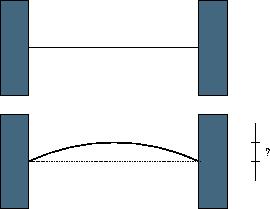| Time Limit: 1000MS | Memory Limit: 30000K | |
| Total Submissions: 17050 | Accepted: 4503 |
Description
 When a thin rod of length L is heated n degrees, it expands to a new length L'=(1+n*C)*L, where C is the coefficient of heat expansion.
When a thin rod of length L is heated n degrees, it expands to a new length L'=(1+n*C)*L, where C is the coefficient of heat expansion. When a thin rod is mounted on two solid walls and then heated, it expands and takes the shape of a circular segment, the original rod being the chord of the segment.
Your task is to compute the distance by which the center of the rod is displaced.
Input
The input contains multiple lines. Each line of input contains three non-negative numbers: the initial lenth of the rod in millimeters, the temperature change in degrees and the coefficient of heat expansion of the material. Input data guarantee that no rod expands by more than one half of its original length. The last line of input contains three negative numbers and it should not be processed.
Output
For each line of input, output one line with the displacement of the center of the rod in millimeters with 3 digits of precision.
Sample Input
1000 100 0.0001 15000 10 0.00006 10 0 0.001 -1 -1 -1
Sample Output
61.329 225.020 0.000
Source
#include<iostream> #include<cstdio> #include<cmath> #include<cstring> #include<sstream> #include<algorithm> #include<queue> #include<deque> #include<iomanip> #include<vector> #include<cmath> #include<map> #include<stack> #include<set> #include<fstream> #include<memory> #include<list> #include<string> using namespace std; typedef long long LL; typedef unsigned long long ULL; #define MAXN 20009 #define N 21 #define MOD 1000000 #define INF 1000000009 const double eps = 1e-8; const double PI = acos(-1.0); /* 给一个弦长和弧长 求圆心到弦的距离 直接求不太好求 可以用二分搜索 为了避免精度损失应该 尽量少用除法! 一开始想枚举弧度有点跑偏。。 因为枚举弧度 :sgn(L*x - 2 * l*sin(x / 2)) == 0 这个表达式判断失败后不好分析下一步二分的范围 还是直接枚举H h越小 弧长越大 */ double L, c, n, l; inline int sgn(double x) { //cout << x << endl; if (fabs(x - 0) < eps) return 0; else if (x > 0) return 1; else return -1; } int main() { while (scanf("%lf%lf%lf", &L, &c, &n), !(L<0&&c<0&&n<0)) { l = (1 + n*c)*L; double beg = 0, end = L/2; while (sgn(end - beg) > 0) { double mid = (beg + end) / 2; double r = (4 * mid*mid + L*L) / 8 / mid; //cout << ":" << mid << endl; if (sgn(2*r*asin(L/2/r)-l) < 0)//弧长应当加大,所以h应该减小 { beg = mid; } else end = mid; } printf("%.3lf ", beg); } }